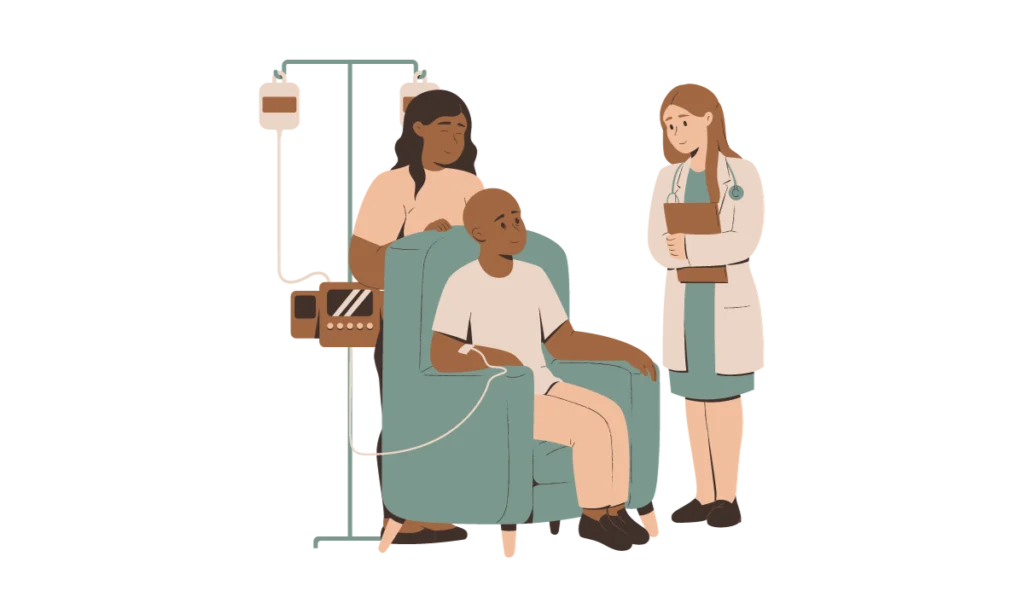5 Surprising Benefits of Plant-Based Diets for Cancer Prevention
Unlock the secrets to cancer prevention. Discover 5 surprising benefits of plant-based diets and how they can protect you from digestive system cancers.

In This Article:
Key Points
- Reduction in Digestive System Cancers: Plant-based diets are associated with a reduced risk of various types of digestive system cancers including pancreatic, colorectal, gastric, and liver cancer.
- Rich in Essential Nutrients: Fruits, vegetables, grains, and other plant-based foods are packed with vitamins, minerals, and phytochemicals that help regulate antioxidant and anti-inflammatory processes. These nutrients are crucial for safeguarding our health against cancer.
- Protection Against Oxidative Stress: Plant-based foods are rich in natural antioxidants like vitamin C, vitamin E, polyphenols, anthocyanins, flavonoids, lignans, and phenolic acids. These antioxidants help eliminate free radicals, thereby reducing the risk of cancer.
- Support for Anti-inflammatory Processes: The phytochemicals found in plant-based foods help to regulate anti-inflammatory processes in the body. Inflammation is known to contribute to tumor development and progression, so reducing inflammation can help prevent cancer.
- Global Impact: The results of studies conducted in Europe, Asia, and North America have shown that plant-based diets are significantly associated with a lower risk of digestive system cancers in these regions. This suggests that the benefits of plant-based diets for cancer prevention can have a global impact.
Relationship Between Plant-Based Diets and Cancer Risk
Global Impact of Digestive System Cancers

Liver, esophageal, gastric, and colorectal tumors are significant global health concerns, featuring in the top 10 most prevalent healthcare issues A Trusted Source Global Global Burden of Disease Cancer C, Fitzmaurice C, Allen C, et al. Global, regional, and national cancer incidence, mortality, years of life lost, years lived with disability, and disability-adjusted life-years for 32 cancer groups, 1990 to 2015: a systematic analysis for the global burden of disease study.JAMA Oncol.(2017) 3:524–48. doi: 10.1001/jamaoncol.2016.5688 PubMed AbstractCrossRef Full TextGoogle Scholar.
The 2020 GLOBOCAN database revealed over 1.9 million new colorectal cancer cases, causing 935,000 deaths A Trusted Source Sung H, Ferlay J, Siegel RL, Laversanne M, Soerjomataram I, Jemal A, et al. Global cancer statistics 2020: GLOBOCAN estimates of incidence and mortality worldwide for 36 cancers in 185 countries.CA Cancer J Clin.(2021) 71:209–49. doi: 10.3322/caac.21660 PubMed AbstractCrossRef Full TextGoogle Scholar.
By 2040, the cancer burden might escalate to 27.5 million new cases annually.
As such, the establishment of primary prevention programs is urgent and vital A Trusted Source Clinton SK, Giovannucci EL, Hursting SD. The world cancer research fund/american institute for cancer research third expert report on diet, nutrition, physical activity, and cancer: impact and future directions.J Nutr.(2020) 150:663–71. doi: 10.1093/jn/nxz268 PubMed AbstractCrossRef Full TextGoogle Scholar.
The Crucial Role of Diet in Cancer Prevention
Diet is an integral part of our daily lives, receiving substantial attention in cancer research.
The World Cancer Research Fund (WCRF) and the American Institute for Cancer Research (AICR) provided 10 cancer prevention recommendations, emphasizing the importance of diet A Trusted Source World Cancer Research Fund/American Institute for Cancer Research Diet Nutrition Physical Activity Cancer: A Global Perspective. Continuous Update Project Expert Report. (2018). Available online at:http://dietandcancerreport.org(accessed on April 19, 2022)..
Studies have shown that red and processed meats are linked to a higher risk of digestive system cancers A Trusted Source Yiannakou I, Barber LE, Li S, Adams-Campbell LL, Palmer JR, Rosenberg L, et al. A prospective analysis of red and processed meat intake in relation to colorectal cancer in the black women's health study.J Nutr.(2021) 52:1254–62. doi: 10.1093/cdn/nzab036_030 PubMed AbstractCrossRef Full TextGoogle Scholar A Trusted Source Cross AJ, Ferrucci LM, Risch A, Graubard BI, Ward MH, Park Y, et al. A large prospective study of meat consumption and colorectal cancer risk: an investigation of potential mechanisms underlying this association.Cancer Res.(2010) 70:2406–14. doi: 10.1158/0008-5472.CAN-09-3929 PubMed AbstractCrossRef Full TextGoogle Scholar.
On the contrary, plant-based diets are gaining recognition for their cancer-preventing potential A Trusted Source Oussalah A, Levy J, Berthezene C, Alpers DH, Gueant JL. Health outcomes associated with vegetarian diets: an umbrella review of systematic reviews and meta-analyses.Clin Nutr.(2020) 39:3283–307. doi: 10.1016/j.clnu.2020.02.037 PubMed AbstractCrossRef Full TextGoogle Scholar.
Understanding the Relationship Between Plant-Based Diets and Cancer Risk
However, recent findings from a meta-analysis revealed no significant association between vegetarian diets and a lower risk of certain cancers compared to non-vegetarian diets A Trusted Source Godos J, Bella F, Sciacca S, Galvano F, Grosso G. Vegetarianism and breast, colorectal and prostate cancer risk: an overview and meta-analysis of cohort studies.J Hum Nutr Diet.(2017) 30:349–59. doi: 10.1111/jhn.12426 PubMed AbstractCrossRef Full TextGoogle Scholar.
The study included six cohort studies but had limitations in terms of cancer types and dietary patterns evaluated.
Hence, the relationship between plant-based diets and digestive system cancers requires further investigation.
Decoding the Various Types of Vegetarian Diets
Vegetarian diets are classified into several types based on animal product consumption A Trusted Source Bye ZL, Keshavarz P, Lane GL, Vatanparast H. What role do plant-based diets play in supporting the optimal health and well-being of canadians? a scoping review.Adv Nutr.(2021) 12:2132–46. doi: 10.1093/advances/nmab061PubMed AbstractCrossRef Full TextGoogle Scholar A Trusted Source Rizzo NS, Jaceldo-Siegl K, Sabate J, Fraser GE. Nutrient profiles of vegetarian and nonvegetarian dietary patterns.J Acad Nutr Diet.(2013) 113:1610–9. doi: 10.1016/j.jand.2013.06.349 PubMed AbstractCrossRef Full TextGoogle Scholar A Trusted Source Craddock JC, Probst YC, Peoples GE. Vegetarian and omnivorous nutrition - comparing physical performance.Int J Sport Nutr Exerc Metab.(2016) 26:212–20. doi: 10.1123/ijsnem.2015-0231PubMed AbstractCrossRef Full TextGoogle Scholar.
These include vegan, pesco-lacto-ovo-vegetarian, lacto-ovo-vegetarian, pesco-vegetarian, ovo-vegetarian, lacto-vegetarian, and semi-vegetarian diets.
Each type has specific food restrictions and allowances, highlighting the diversity within vegetarian diets.

Other Popular Plant-Based Dietary Patterns
Apart from vegetarian diets, other plant-based diets such as the Mediterranean, prudent, and DASH diets are widely recognized and followed A Trusted Source Chandler PD, Balasubramanian R, Paynter N, Giulianini F, Fung T, Tinker LF, et al. Metabolic signatures associated with western and Prudent dietary patterns in women.Am J Clin Nutr.(2020) 112:268–83. doi: 10.1093/ajcn/nqaa131PubMed AbstractCrossRef Full TextGoogle Scholar A Trusted Source Mohseni R, Mohseni F, Alizadeh S, Abbasi S. The association of dietary approaches to stop hypertension (DASH) diet with the risk of colorectal cancer: a meta-analysis of observational studies.Nutr Cancer.(2020) 72:778–90. doi: 10.1080/01635581.2019.1651880 PubMed AbstractCrossRef Full TextGoogle Scholar.
These diets focus on fruits, vegetables, cereals, and limit animal product consumption, aligning with the plant-based diet definition A Trusted Source Molina-Montes E, Salamanca-Fernandez E, Garcia-Villanova B, Sanchez MJ. The Impact of plant-based dietary patterns on cancer-related outcomes: a rapid review and meta-analysis.Nutrients.(2020) 12:2010. doi: 10.3390/nu12072010 PubMed AbstractCrossRef Full TextGoogle Scholar.
In summary, the connection between plant-based diets and digestive system cancers is a complex and evolving field.
The study aims to provide valuable insights and evidence to guide dietary choices in cancer prevention.
Research on plant-based diets with cancers
Unraveling the Relationship Between Plant-Based Diets and Digestive System Cancer
Upon a comprehensive analysis of cohort and case-control studies The Supplementary Material can be found online at Link, it was found that plant-based diets are significantly associated with a reduced risk of digestive system cancer.
The results were consistent across both cohort adjusted RR = 0.82, 95% CI: 0.78–0.86, P < 0.001, and case-control studies (adjusted OR = 0.70, 95% CI: 0.64–0.77, P < 0.001).
Uncovering the Protective Factors of Plant-Based Diets
Plant-based diets exhibited a protective role against various types of digestive system cancers including pancreatic, colorectal, gastric, and liver cancer in both cohort and case-control studies.
However, no significant relationship was observed between plant-based diets and esophageal cancer in cohort studies.
Analyzing the Impact of Diet on Specific Types of Digestive Cancers
When delving deeper into the specific types of digestive system cancers, it was observed that plant-based diets were significantly associated with a lower risk of pancreas, colorectal, colon, rectal, gastric, and liver cancer, but not esophageal cancer.

Diving Deep into the Variations of Plant-Based Diets
The study Zhao, Yujie, et al. “The Relationship Between Plant-Based Diet and Risk of Digestive System Cancers: A Meta-Analysis Based on 3,059,009 Subjects.” Frontiers in Public Health, vol. 10, June 2022. Frontier. revealed that among the various types of plant-based diets, vegan, prudent, semi-vegetarian, and Mediterranean diets showed a significant association with a reduced risk of digestive system cancers.
However, pesco-vegetarian and lacto-ovo-vegetarian diets did not exhibit a significant association.
The Global Perspective: How Geography Influences the Impact of Diet on Cancer:
The study also analyzed the impact of geography on the relationship between plant-based diets and digestive system cancer.
Results showed that plant-based diets were significantly associated with a lower risk of digestive system cancers in Europe, Asia, and North America in both cohort and case-control studies.
The Adventist Faith and Its Implications on Digestive System Cancer
The study found a prominent difference in the risk of digestive system cancer among people of the Adventist faith compared to the normal population.
The protective effect of plant-based diets was more pronounced in the Adventist population.
In conclusion, the study provides robust evidence supporting the protective role of plant-based diets against digestive system cancers.
The findings highlight the importance of promoting plant-based diets as a preventive measure for digestive system cancers.
The results also emphasize the need for further research to understand the impact of different types of plant-based diets and the influence of geographical factors on the relationship between diet and cancer.
Plant-Based Diets & Digestive Cancer: What We Found
The study reveals a significant connection between plant-based diets and a reduced risk of digestive system tumors, marking a groundbreaking discovery in the field of nutritional science and oncology.
It was found that factors such as geographic location, cancer type, and diet classification can contribute to variations in study results, emphasizing the need for more focused research in this area.
The Science Behind the Connection
The relationship between diet and cancer is deeply rooted in biological processes such as inflammation, oxidative stress, and insulin regulation A Trusted Source Steck SE, Murphy EA. Dietary patterns and cancer risk.Nat Rev Cancer.(2020) 20:125–38. doi: 10.1038/s41568-019-0227-4 PubMed AbstractCrossRef Full TextGoogle Scholar.
Oxidative stress can lead to DNA damage and, subsequently, cancer if not repaired in time A Trusted Source Halliwell B. The antioxidant paradox: less paradoxical now?Br J Clin Pharmacol.(2013) 75:637–44. doi: 10.1111/j.1365-2125.2012.04272.x PubMed AbstractCrossRef Full TextGoogle Scholar.
Similarly, the way our bodies manage carbohydrates and energy through insulin can influence cancer risk A Trusted Source Pollak M. Insulin and insulin-like growth factor signalling in neoplasia.Nature Rev Cancer.(2008) 8:915–28. doi: 10.1038/nrc2536 PubMed AbstractCrossRef Full TextGoogle Scholar.
Inflammation is a known contributor to tumor development and progression A Trusted Source Diakos CI, Charles KA, McMillan DC, Clarke SJ. Cancer-related inflammation and treatment effectiveness.Lancet Oncol.(2014) 15:e493–503. doi: 10.1016/S1470-2045(14)70263-3 PubMed AbstractCrossRef Full TextGoogle Scholar.
LEARN MORE:
6 Reasons Why VSL#3 is Ideal for Irritable Bowel Syndrome
Pain Management: 7 Insights from the Microbiota-Gut-Brain Axis
5 Mind-Blowing Facts About Stress and Chronic Visceral Pain
5 Triggers for Abdominal Pain in Obstructive Bowel Disorders (OBD)
2 Strategies to Treat Spinal Degenerative Diseases
The Power of Plant-Based Foods
Fruits, vegetables, grains, and other plant-based foods are rich in essential nutrients that can safeguard our health A Trusted Source Molina-Montes E, Salamanca-Fernandez E, Garcia-Villanova B, Sanchez MJ. The Impact of plant-based dietary patterns on cancer-related outcomes: a rapid review and meta-analysis.Nutrients.(2020) 12:2010. doi: 10.3390/nu12072010 PubMed AbstractCrossRef Full TextGoogle Scholar A Trusted Source Subramaniam S, Selvaduray KR, Radhakrishnan AK. bioactive compounds: natural defense against cancer?Biomolecules.(2019) 9:758. doi: 10.3390/biom9120758 PubMed AbstractCrossRef Full TextGoogle Scholar.
These foods are packed with vitamins, minerals, and phytochemicals that help regulate antioxidant and anti-inflammatory processes A Trusted Source Bye ZL, Keshavarz P, Lane GL, Vatanparast H. What role do plant-based diets play in supporting the optimal health and well-being of canadians? a scoping review.Adv Nutr.(2021) 12:2132–46. doi: 10.1093/advances/nmab061PubMed AbstractCrossRef Full TextGoogle Scholar A Trusted Source Hever J, Cronise RJ. Plant-based nutrition for healthcare professionals: implementing diet as a primary modality in the prevention and treatment of chronic disease.J Geriatr Cardiol.(2017) 14:355–68. doi: 10.11909/j.issn.1671-5411.2017.05.012 PubMed AbstractCrossRef Full TextGoogle Scholar.
For instance, cruciferous vegetables, allium vegetables, tomatoes, green tea, and whole grains are excellent sources of fiber, sulfur compounds, carotenoids, and polyphenols that have been proven to fight against cancer A Trusted Source Subramaniam S, Selvaduray KR, Radhakrishnan AK. bioactive compounds: natural defense against cancer?Biomolecules.(2019) 9:758. doi: 10.3390/biom9120758 PubMed AbstractCrossRef Full TextGoogle Scholar.
Carotenoids, in particular, are known for their antioxidant properties that help reduce cancer risk A Trusted Source Singh B, Singh JP, Kaur A, Singh N. Bioactive compounds in banana and their associated health benefits - a review.Food Chem.(2016) 206:1–11. doi: 10.1016/j.foodchem.2016.03.033 PubMed AbstractCrossRef Full TextGoogle Scholar.
Furthermore, natural antioxidants found in plants, such as vitamin C, vitamin E, polyphenols, anthocyanins, flavonoids, lignans, and phenolic acids,
have demonstrated anti-inflammatory and anti-cancer properties A Trusted Source Zhang JJ, Li Y, Zhou T, Xu DP, Zhang P, Li S, et al. Bioactivities and health benefits of mushrooms mainly from China.Molecules.(2016) 21:938 doi: 10.3390/molecules21070938 PubMed AbstractCrossRef Full TextGoogle Scholar A Trusted Source Xu DP, Li Y, Meng X, Zhou T, Zhou Y, Zheng J, et al. Natural antioxidants in foods and medicinal plants: extraction, assessment and resources.Int J Mol Sci.(2017) 18:96. doi: 10.3390/ijms18010096 PubMed AbstractCrossRef Full TextGoogle Scholar.

A Closer Look at Eggplant
A study conducted by Afshari et al. showed that eggplant extract has potential anti-cancer benefits.
Rich in phenolic components, eggplants exhibit powerful antioxidant properties that help eliminate free radicals, thereby reducing the risk of cancer A Trusted Source Afshari F, Seraj H, Hashemi ZS, Timajchi M, Ensiyeh O, Ladan G, et al. The cytotoxic effects of eggplant peel extract on human gastric adenocarcinoma cells and normal cells.Mod Med Lab J.(2017) 1:77–83. doi: 10.30699/mmlj17.1.2.77 CrossRef Full TextGoogle Scholar A Trusted Source Samtiya M, Aluko RE, Dhewa T, Moreno-Rojas JM. Potential health benefits of plant food-derived bioactive components: an overview.Foods.(2021) 10:839. doi: 10.3390/foods10040839 PubMed AbstractCrossRef Full TextGoogle Scholar.
Discussion
- Highlight the significant global health concern posed by digestive system cancers, including liver, esophageal, gastric, and colorectal tumors.
- Discuss the important role of diet in cancer prevention, with reference to the World Cancer Research Fund (WCRF) and the American Institute for Cancer Research (AICR) recommendations.
- Examine the relationship between plant-based diets and digestive system cancer risk, acknowledging the mixed findings from recent meta-analyses and the need for further research.
- Explore the various types of vegetarian diets and other popular plant-based dietary patterns, such as the Mediterranean, prudent, and DASH diets.
Conclusion
- Conclude that the relationship between plant-based diets and digestive system cancers is a complex and evolving field that requires further investigation.
- Emphasize the potential protective role of plant-based diets against various types of digestive system cancers, as supported by the findings from cohort and case-control studies.
- Call for more focused research to understand the impact of different types of plant-based diets and the influence of geographical factors on the relationship between diet and cancer.
- Highlight the importance of promoting plant-based diets as a preventive measure for digestive system cancers.
Review date not set.
How we reviewed this article:
Latest on:





